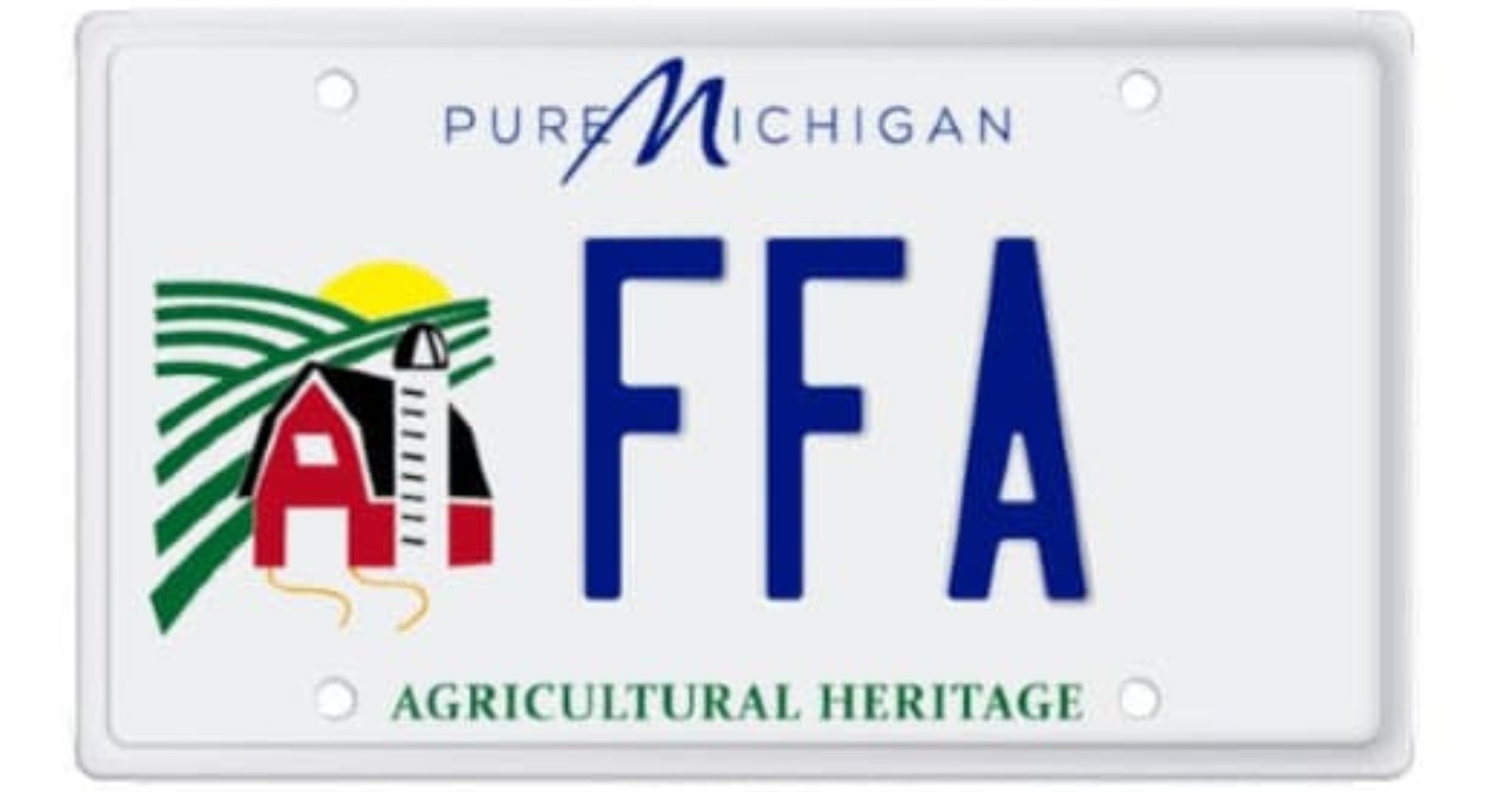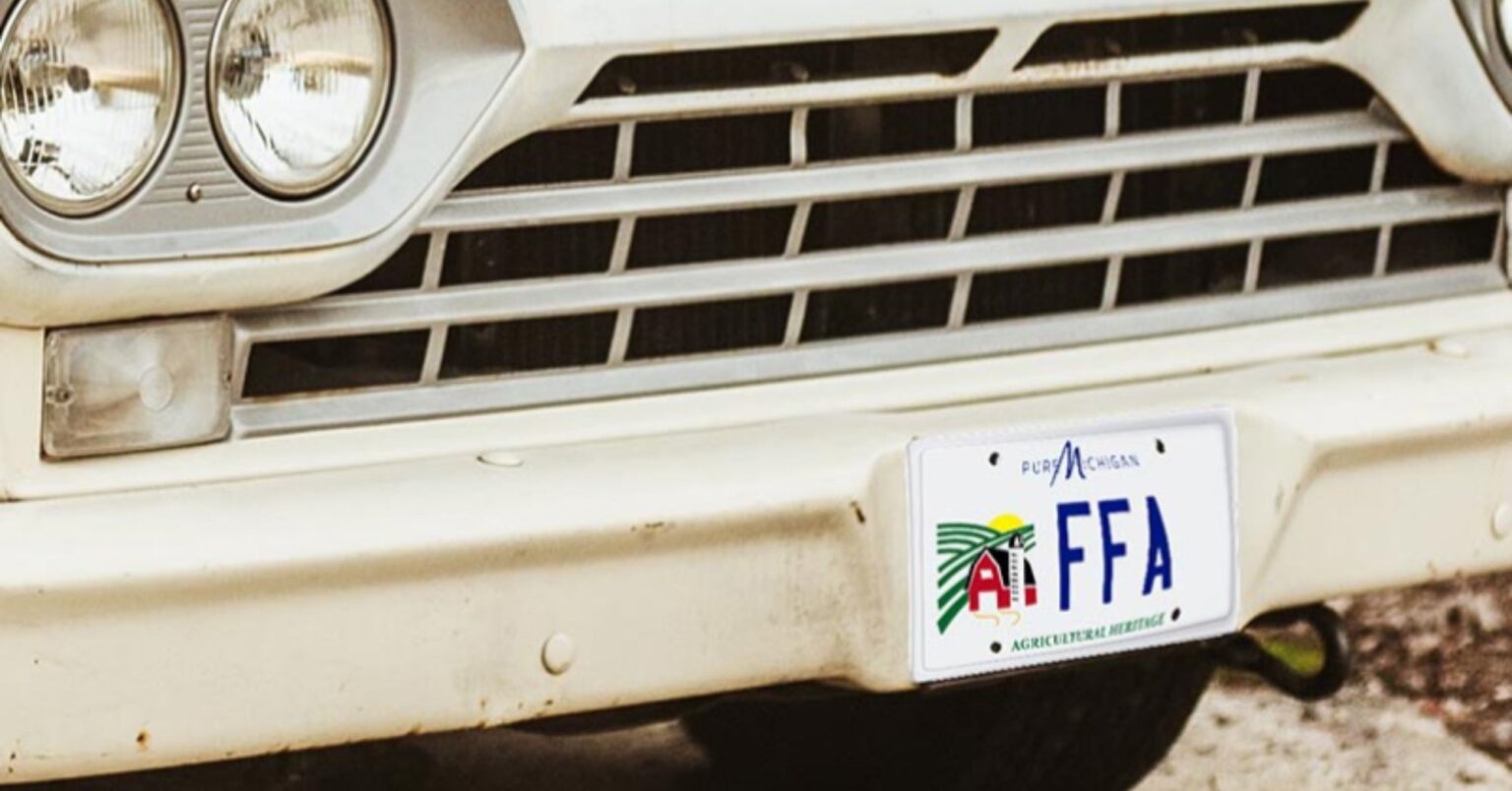The Michigan Agricultural Heritage Plate, adorned with a picturesque red barn, silo, and sunlit fields, does more than just decorate a vehicle — it fuels critical agricultural education for K-12 students.
Originally available only for passenger vehicles, the plate was expanded in 2019 to include commercial and university vehicles, thanks to the efforts of Bob Craig, former development director of the Michigan Department of Agriculture. After launching his own business, Craig discovered he could no longer use the plate on his commercial vehicle, which led him to push for legislation to broaden access to the specialty plate. With support from Michigan State Sen. Roger Victory, the bill passed with bipartisan approval.
The Ag Heritage plate is a statewide effort to support the Michigan FFA and agriculture education, with 100 percent of the funds generated from sales earmarked to the Michigan FFA Glassbrook Endowment Fund.

In 2021, Michigan FFA Foundation Board Chairman Burt Henry introduced the Ag Heritage License Plate Corporate Pledge Challenge, which encouraged agricultural businesses across the state to adopt the Ag Heritage Plate for their company vehicles.
“The Ag Heritage plate pledge program is a statewide effort to support the Michigan FFA and agricultural education,” Henry said. “In the past 20 years, we’ve raised $1 million through individual drivers purchasing the Ag Heritage Plate. Our goal now is to raise the next $1 million in 10 years or less.”
Almost immediately after the challenge was launched, ag businesses began adding the ag plates to corporate vehicles including Michigan Farm Bureau, AgroLiquid, Crystal Flash, Michigan Ag Commodities, Michigan Corn Growers Association, Star of the West, and the Michigan Pork Producers.
More than 8,800 FFA members in 124 chapters make their homes in Michigan. And it’s no wonder, because the state is an agricultural powerhouse, contributing over $104.7 billion annually to the state’s economy. The industry is supported by more than 45,000 farms spread across 9.5 million acres. Michigan’s farms range from small family operations to large-scale enterprises, with the average farm operating on 210 acres. These farms produce a diverse range of products, making Michigan one of the most agriculturally diverse states in the country.
Leading the state’s agricultural output are dairy, corn, soybeans, and sugar beets, alongside specialty crops such as apples and cherries. Dairy alone brings in over $2.4 billion annually, with Michigan ranking among the top 10 dairy-producing states in the country. Other key contributors include beef, pork, and turkey production, which also bolster the state’s agricultural income.
The plate costs $35, with $25 from each sale going directly to the Michigan FFA Foundation to support K-12 agricultural education programs. An additional $10 from renewals also contributes to an endowment fund, ensuring long-term support for these educational initiatives. However, the plate must meet Michigan’s stringent sales requirements — 2,000 new plates sold in the first year and 500 new plates every two years thereafter — to avoid discontinuation.
Specialty fundraising plates are not new to Michigan. They date back to 1994, when the state introduced a plate to benefit the Olympic Education Training Center at Northern Michigan University. Since then, plates have raised funds for causes ranging from wildlife preservation to public universities. In 2023, another plate joined this lineup: the Michigan 4-H fundraising plate.
On Aug. 15, 2023, Gov. Gretchen Whitmer signed legislation to establish the Michigan 4-H license plate. The signing event in Van Buren Charter Township was celebrated by Michigan 4-H youth, volunteers, and officials. The plate will help raise funds for the Michigan 4-H Foundation, which supports hands-on learning experiences for more than 100,000 young people across the state each year.
“4-H programs help kids develop leadership skills, become active in their communities, and form lasting friendships,” Whitmer said. “This new plate will provide critical funding to keep these programs thriving in all 83 Michigan counties.”
The 4-H plate will function similarly to the Ag Heritage Plate, with a portion of the proceeds going to the Michigan 4-H Foundation to support youth development programs. Quentin Tyler, Director of Michigan State University Extension, emphasized the importance of the plate, saying, “This new fundraising license plate will help us reach and serve more Michigan youth. We thank everyone who helped make this opportunity possible.”
The legislation for the 4-H plate, introduced by Reps. Matthew Bierlein (R-Vassar) and Reggie Miller (D-Van Buren Township), passed with overwhelming bipartisan support in both the Michigan House and Senate. The sale of the 4-H plate is expected to provide a new revenue stream while also increasing visibility for the iconic 4-H clover emblem across the state.
Together, the Ag Heritage Plate and the 4-H fundraising plate represent more than just symbols of Michigan’s agricultural heritage. They are instrumental in supporting programs that educate, inspire, and develop the next generation of agricultural leaders — ensuring that Michigan’s rich farming tradition continues to thrive.
This is part of a state-by-state series from AGDAILY that highlights agriculture-themed license plates nationwide. Read more articles from the series here.


